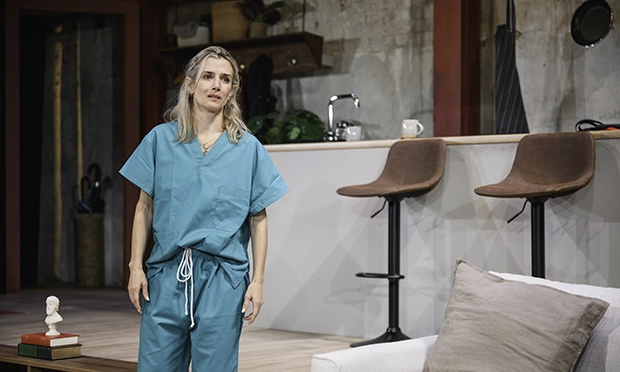23.5 Hours, Park Theatre, stage review: ‘Refreshing but unfathomable’

Lisa Dwan impresses as Leigh. Photograph: Charles Flint
Two years ago, in this very theatre, I reviewed Carey Crim’s weighty drama, Never Not Once, about the spiralling after effects of rape.
Now her new piece, 23.5 Hours, takes a different angle on the subject of sexual misconduct.
Crim builds us a happy, all-American, 21st-century family.
Carla Goodman’s middle-class living room-cum-diner houses enigmatic teacher Tom (David Sturzaker), loving yet fiery nurse Leigh (Lisa Dwan), and their bouncing blonde teenager Nicholas (Jem Matthews).
The family’s cheery, opinionated neighbours Jayne (Allyson Ava-Brown) and Bruce (Jonathan Nyati) are on hand to round out the microcosm.
This slice of New Jersey is sketched with skill by the East Coast writer, but even in the warm-hued room, between chuckling friends and a few too many glasses of wine, you know catastrophe is about to walk right in swinging a baseball bat.
Boom! The pretty domestic scene is obliterated by Tom being accused, and later convicted and imprisoned for an inappropriate sexual relationship with a student.
The rest of the two-hour play is spent unveiling the fallout from the physiological nuclear explosion. And it is refreshingly told from the perspective of Leigh, now left alone with her son, as she ponders the ramifications of Tom’s actions and her gnawing doubts.
Dwan and Matthews craft a genuine mother-son bond after surviving two years of isolation and public hatred.
Leigh and Jayne also have a gritty friendship break-up that twangs everyone’s insides, as painful as a sundering of lovers.
Jamie Platt’s lighting builds intimacy well, with blue washes and soft spots. Dwan, alone and smoking a stolen spliff as she sits broken on the kitchen floor, is a moment of such visual catharsis.
However, Katharine Farmer’s direction is overeager to make this story hard-hitting, and swings the hammer of emotion indiscriminately.
We slip into a repetitive rhythm. Quiet whispering scenes predictably crescendo up into shouting matches between almost every character, then fold back down again to sad staring and weeping revelations.
Dwan’s accent and characterisation are by far the best, but she has a tendency to rush. Elsewhere, accents slip routinely and melodrama knocks its sequinned gloved hand on the family’s front door.
Nevertheless, the piece prompted an interesting discussion about the abuse of power with my theatre date. So, arguably, the aims of the production company Blue Touch and their partnered charity StopSO have been achieved.
Others have explored this issue with such nuance – Notes On a Scandal, Cracks, An Education, to name a few – that 23.5 Hours struggles to compete.
Leigh and Tom stand alone on the stage in the last scene and his new mobile phone rings. They look at one another with the oft-repeated meaningful glance, as if the audience should know the importance of the call. The lights focus in on our embattled couple, and a pause stretches out.
Sadly, the play hasn’t done enough to give the moment any meaning. We have no idea who’s calling, and the phone rings on into the falling darkness, unanswered and unfathomable.
23.5 Hours runs until 12 October at Park Theatre.
